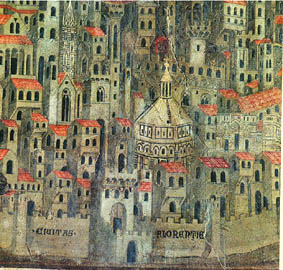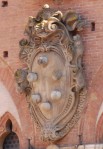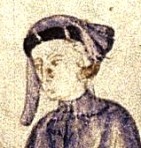Again, please welcome Tinney Sue Heath, author of A Thing Done, as she discusses the impact the legend of Charlemagne had on medieval Florentine identity.—Kim
By Tinney Sue Heath
The Florentines believed Charlemagne had re-founded their city in 801 after its destruction by Attila (actually by Totila the Goth, in 410). Nor did they forget that “when the Lombard fang bit holy Church, under its wings Charles the Great came victorious to her aid,” referring to Charlemagne’s victory over the Lombard King Desiderius in 773. These words are spoken by the soul of the Emperor Justinian in the Heaven of Mercury (Dante’s Paradiso 6.94-96, all translations in this post by Robert Durling).
Several of the great Florentine families prided themselves on their supposed descent from one of Charlemagne’s knights. The Medici, for example, held that their ancestor, the brave knight Averardo, had done battle with a ferocious giant and slain him. They claimed that the circles on their coat of arms represented dents in Averardo’s shield from the blows dealt by the giant’s mace.
Also, the Adimari clan claimed that their progenitor Adimaro was one of Charlemagne’s knights. Dante did not think highly of this family; he called them “the presumptuous clan that is like a dragon against those who flee, but is placated like a lamb by those who show their teeth or their purse” (Paradiso 16.115-117).

Detail of a fresco depicting Florence about the mid-1300s (this public domain image and the one of Dante via Wikimedia Commons).
Some scholars (though not by any means a majority) believe that Charlemagne figures once more in the Divine Comedy. In Dante’s cryptic and much-debated prophecy in Purgatorio 33.43, where he poses a riddle involving the number 515, they think he might be referring to the year 1315, which is to say, 515 years after the coronation of Charlemagne in A.D. 800. We are not, however, aware of anything particularly cataclysmic by Dante’s standards that occurred in 1315.
Yet it was the sudden death in 1313 of a successor to Charlemagne, Holy Roman Emperor Henry VII, that dealt the exiled Dante the blow that destroyed any hope he had of ever returning to his native Florence. Gradually, over the years of his exile, Dante the former Guelf had come to believe that this young and relatively untried emperor could stand up to stubborn Florence and restore him, its unjustly exiled citizen, to his rightful place. He began to see the empire as the necessary corrective to what he saw as the injustices and evils perpetrated by his city.
Dante was among the many who paid homage to Henry after his coronation in Milan, and he urged the emperor, in letters that still exist, to march on Florence and even to attack her. The empire that Charlemagne had created was to have been Dante’s salvation, and his disappointment was bitter indeed when his hopes unraveled.
Perhaps when Dante wrote in his Divine Comedy about watching Charlemagne and Roland as if following the falcon in its flight, he was thinking of the eagle that symbolized the empire and of what might have been.
Tinney Sue Heath is the author of A Thing Done, which is about a jester who gets caught up in a prank that leads to a vendetta among the ruling families in Florence. For more about Tinney and her work, visit her website, tinneyheath.com, or her blog, Historical Fiction Research.
Previously: Dante’s vision of Charlemagne and Roland in the afterlife.
The lasting power of legends related to Roland.
Tomorrow: Let’s go to the (blog) hop




Very interesting and informative post. I did not realize Dante made so many references to historical events and persons (never having read him, *wincing*). I have been researching the Lombard kingdom in Italy and the aftermath (btw Totila the Goth was a later successor to Theoderic, during the Byzantine reconquest). You have given me some new direction. I will be looking for your book!
LikeLike
Pingback: A Story of Shifting Alliances and Revenge « Kim Rendfeld